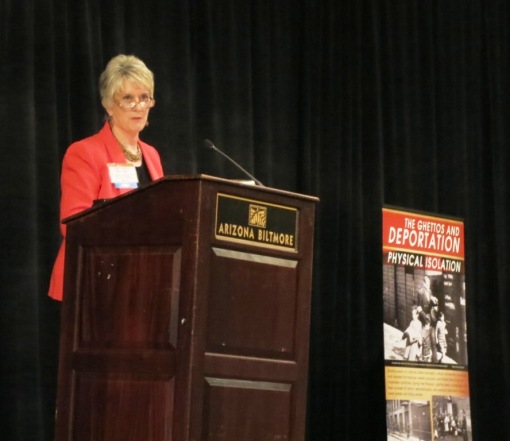A seminar titled “What You Do Matters” challenged Arizona lawyers at Wednesday’s State Bar Convention to confront a disturbing history of an esteemed legal system. When German lawyers and judges bent to pressure and ultimately cooperated with the Nazi government, they essentially became collaborators in the horrors of the Holocaust. A distinguished panel of lawyers and scholars explored a profession’s culpability in state-sponsored murder.
How does a system of justice become that in name only?
William Meinecke, Jr., a historian from the United States Holocaust Memorial Museum, traced the stunning devolution of a system of laws that previously had enshrined personal freedoms and ensured a just society.
As German society faced numerous social and economic ills, the Nazi Party sprang up and provided radical commentary on the mainstream government led by President Paul von Hindenburg. Finally, as an attempt to wrangle and coopt the young and loud Nazis, Hindenburg named Adolph Hitler the nation’s Chancellor in 1933. Meinecke said that Hindenburg thought the Nazis would play the role of “junior partners,” and that the coopted group could not criticize the government anymore. A compromise would be forged, and Nazi radicalism could be kept in check.
That compromise crumbled in short order. A significant government building, the Reichstag, was burned in an arson. The new Chancellor asked for—and got—emergency powers to regain public control. The emergency decree extinguished substantial parts of the constitution in regard to individual rights and liberties.
Like Shakespeare’s Dick the Butcher centuries before, Hitler viewed lawyers and laws as an impediment. Meinecke quoted the dictator on the topic: “Lawyers are people who are faulty since birth or made that way thru usage.”
As a result, the legal system could stand wherever it propped up Hitler’s vision. When it offered resistance, it was subverted. In significant areas, there would be no judicial oversight. Police decisions that infringed on liberties were determined to be outside judicial review. And at important junctures, fearful judges and courts breathed a sigh of relief as their jurisdiction was stripped.
“Law gave him a blank check,” Meinecke said.
He then described in searing detail three example of the depth of the cooperation that helped lead to the murder of 6 million people. The three instances involved areas of focus reviewed by courts thousand times a day: a contracts case, a parenting matter, and an arson—of the Reichstag.
Using the words of the laws and the opinions of the court, the speaker provided a damning indictment of a system bent on self-preservation—at horrific cost.
In each case, Meinecke said, “The court followed the law and ended up with injustice.”
The afternoon’s other panelists revealed the pertinent lessons we can learn in the United States and in Arizona.
ASU Law Professor David Kader offered insights largely drawn from the Nuremburg war trials that followed the war. He ably described the “incremental progressive corruption” that gripped Germany and has done so around the world far more recently. The difference, he said, is that “We have international tools now. We just need the will to use them.”
Yavapai County Attorney Sheila Polk had brought to Arizona the coordinated training via the Holocaust Museum. That led to ethics training for prosecutors, judges and ultimately the National Conference of Chief Justices. As moderator Jerry Landau described it, “That training changed my life.”
On Wednesday’s panel, Polk described the training and read some of the feedback she’s received from attorneys, police officers and investigators, and detention officers. As one detention officer described it, the training gave “a wide angle view of personal responsibility in a bureaucracy”—similar to the situation lawyers faced in the Third Reich.
It fell to former Chief Justice Ruth McGregor to urge the attendees to make ethical connections to their own lives and their own government.
“It is important to ask if there was something lacking in German legal system. But we should be concerned when groups call the courts ‘just another interest’ that should follow popular opinion,” or when politicians suggest jurisdiction stripping. She added that there is current pressure in some quarters to remove the judicial power of review.
“We must remain informed and concerned about things that may reduce the adherence to the rule of law.”
Thankfully, McGregor brought the rule of law question forward to meet facts that Americans learned only in the past month. She suggested that the acquisition of personal data by the American government via the NSA should be a matter of broad dialogue.
“I should know where our government has struck the balance between privacy and security. And do we truly understand the FISA court? As legal professionals, we should be able to consider and answer those questions.
Follow @azatty


April 7, 2015 at 9:30 am
[…] I covered Dr. Meinecke’s appearance at a previous State Bar Convention here. […]